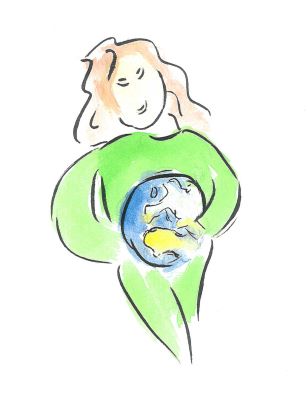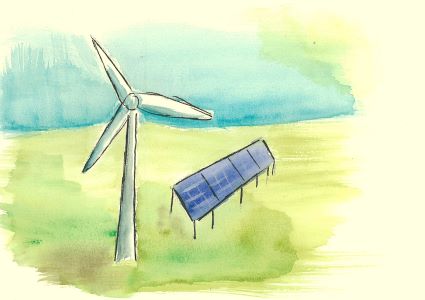
Module 2 - What is the ecological footprint?

All illustrations except the background image: © fbw4/Julia Beckel, available under the Creative Commons Licence BY-NC-SA.
Introduction - Your ecological footprint
What is an Ecological Footprint?
Imagine you're walking in the sand, leaving footprints behind. Those footprints show where you've been. Now, think of the Earth as a big sandy beach. Our ecological footprint is like the mark we leave on this Earth. It shows how much nature we use up in our daily lives.
1. Why Should You Care About Your Ecological Footprint?
You might be wondering why this is important. When we use too much of nature's stuff, like water, energy, and trees, it's not good for our planet. It's like taking too many cookies from a cookie jar – if we keep doing it, there won't be any cookies left for us or others.
When we use up too much of Earth's resources, it can harm the air we breathe, the water we drink, and the animals and plants we share this planet with. That's why understanding and reducing your ecological footprint is important – it's like taking care of our home.
2. How to Calculate Your Ecological Footprint?
You don't need to be a math genius to figure this out. You can get a rough idea of your ecological footprint by thinking about your daily life and answering some simple questions:
You can get a rough idea of your ecological footprint by thinking about your daily life and answering some simple questions:
- Food: Do you eat lots of meat and packaged foods? Or do you enjoy fruits, vegetables, and grains? Eating less meat and processed foods is better for the planet.
- Transportation: How do you usually get around? Cars and planes leave a big footprint. Walking, biking, or using public transport is better for Earth.
- Energy: Do you leave lights on when you're not in a room? Do you use a lot of energy to heat or cool your home? Saving energy is good for our planet.
- Waste: Do you throw away things that could be recycled? Reducing waste and recycling is great for the environment.
3. Ways to Reduce Your Ecological Footprint
Now that you know what an ecological footprint is, let's talk about how you can make it smaller: 
- Save Water: Turn off the tap when you're not using it, fix any leaks, and try to use less water when you shower or wash dishes.
- Use Less Energy: Turn off lights and unplug chargers when you're not using them. Use energy-saving appliances, and try to keep your home warm or cool without using too much energy.
- Reduce, Reuse, Recycle: Don't throw away things that can be used again. When you shop, choose products with less packaging. And always recycle when you can.
- Eat Wisely: Try to eat more fruits, veggies, and grains. Eating less meat, e.g. only once or twice a week instead of every day, is also good for the Earth.
- Buy regional food which does not require long transport, and buy seasonal food. Strawberries in winter come from far away and need lots of energy for bringing them here.
- Use Public Transportation: If you can, use buses, trams, or trains instead of driving alone in a car. It helps reduce pollution.
- Wear your clothes as long as possible, don´t buy new clothes every season. Buy second hand or exchange clothes with your friends.
- Plant Trees: Trees are like Earth's lungs. They breathe in the bad stuff and give us fresh air. If you can, plant trees in your yard or support tree-planting projects is a great way to help.

- If you can, change your heating system to renewable resources and with less emissions, e.g. solar energy, wind energy, biomass energy.
4. Understanding the Earth Overshoot Day
In this chapter, we'll talk about something called "Earth Overshoot Day." Don't worry if it sounds a bit complicated; we'll explain it in a way that's easy to understand. Earth Overshoot Day is an important day for our planet, and we'll show you why.
What is Earth Overshoot Day?
Earth Overshoot Day is like a birthday for our planet, but it's not a happy one. It's the day when we use up all the natural resources that Earth can make in one year. Imagine you have a jar of cookies, and you eat them all in one day. That's what we do with Earth's resources, but it's not a good thing.
Why Does Earth Overshoot Day Matter?
It matters because when we use more resources than Earth can make, it's like spending all your money and not having any left for tomorrow. It's not sustainable, and it can harm our planet. It can make the air dirty, the water polluted, and the animals and plants suffer.
How do we calculate Earth Overshoot Day?
Scientists look at how much food we eat, how much water we use, and how much energy we need. They add it all up to see when we've used too much. When that day comes, it's Earth Overshoot Day.
Sadly, each year the Earth Overshoot Days are coming earlier. For Austria, 2023 this day was on 6th April. If the whole world used as many resources as Austria, they would have all been used up on that day.
Thank you for reading !!